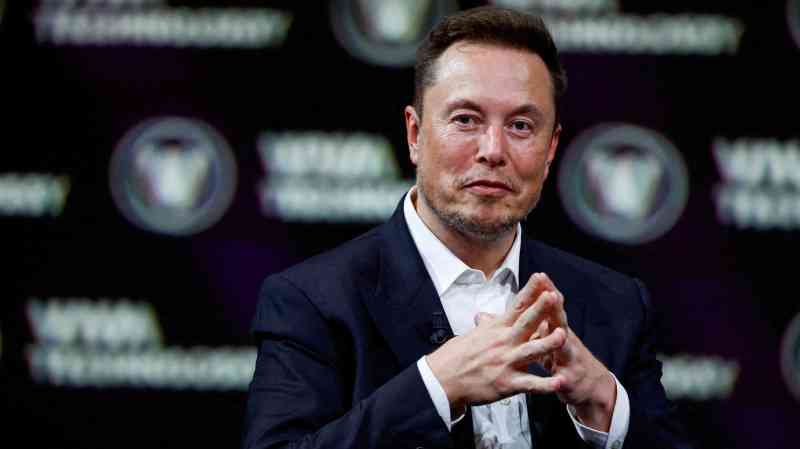How Tesla can get value from Elon Musk
Some puzzlers look a doddle to answer. Take this one: should a bloke running a car company be paid $56 billion? Well, obviously not — unless, of course, the geezer in question is the Tesla boss Elon Musk.
Then the whole thing becomes a proper circus, complete with Delaware courts, shareholders re-voting on something they’ve already voted on, the mooted shift of the company’s incorporation to Texas (from Delaware) and one of Musk’s famous toys-pram routines.
If he doesn’t get his pay deal ratified at Thursday’s AGM, he’s threatening to flounce out and take his AI genius (whatever that may be) to one of his private companies — his rocket outfit SpaceX, say, or brain implant biz Neuralink or X (formerly Twitter) or his AI start-up or even his tunnelling enterprise, The Boring Company. True, some look to have more AI promise than others — how many underground robots does anyone need? Yet, no question he’s spoilt for choice.
Of course, shareholders could try to call his bluff. Musk owns 12.9 per cent of Tesla, a business today valued at $545 billion. Indeed, he’s its biggest investor. It’s also home of most of his realisable wealth. So, if he walks out and kills the share price, he’ll be more dead than anyone else. Even so, calling his bluff and voting down his pay package, as advocated by the proxy agencies ISS and Glass Lewis, has clear risks: Musk would be incandescent, with the size of his tantrum anyone’s guess. To boot, in many ways, he’d have every right to be furious.
Like it or not, there are strong contractual reasons for paying him his moolah: a point the Tesla chairwoman Robyn Denholm has been making, with her line to investors that “we must stand by our deal”. In 2018, with Tesla valued at around $59 billion, the board handed Musk the biggest potential payday in US corporate history — but only if he delivered the moon.
He was given 12 tranches of share options, each representing 1 per cent of Tesla’s stock at the time, with him collecting the lot only if he hit financial targets and took its market value to $650 billion by 2028. The deal was approved by more than 70 per cent of independent investors.
In fact, Musk got there in three years, with Tesla’s market value peaking at $1.2 trillion in 2021 — a bonanza for anyone who sold. It’s after that, though, that things get trickier. A shareholder complained over the board’s alleged fiduciary duty failures, right up to Delaware’s courts. And, in January this year, a judge voided the deal, broadly on the grounds it was far too cosy, with Musk “enjoying thick ties” with the directors awarding his pay. The upshot? A vote to ratify his package that may still not be enough to sway the Delaware court.
Worse, the deal looks far more generous now — even if his options over 304 million shares are today worth only about $46 billion. Since his moon-shooting heroics Musk has fallen back to earth. First, by blowing $44 billion on Twitter: a deal that’s not only proved a lunatic distraction but saw him trash Tesla’s share price with his stock sales to fund it. Second, by Tesla hitting the skids over sales, margins and deliveries. The result is the present oddity: investors voting on paying him full whack for steering the group to $650 billion when it’s clear it’s now worth $100 billion less.
It’s here that a board with any gumption would use its discretion. It should claw back the shares relating to the two $50 billion milestones that are now un-hit; insist he holds the rest for ten years, so they can’t be sold to fund Twitter-style brain fades or AI diversions; and make it explicit that investors will not be blackmailed into coughing up every time he threatens to clear off. Do that and they’d have few grounds not to vote for Musk’s mega payday.
No love at BP
No more orgies at BP. The killjoy compliance department has put paid to that kind of carry-on, updating its code of conduct so that all 90,000 employees must now declare who they’re having it away with at work or risk getting fired: a sort of sack to sack policy for any staffer failing to kiss and tell. No longer is it up to them, either, to decide whether their in-house exploration activities constitute a “conflict of interest”. All flings must now be reported to BP — the Bonking Police.
Indeed, the 4,500 senior bods have to go further — reveal all “intimate work relationships that have occurred over the past three years”, with a three-month deadline to ’fess up. Yes, work liaisons can be exploitative. But it’s not hard to spot whose antics have triggered this urgent policy revamp: BP’s former boss, Bernard Looney.
He took the group’s “performing while transforming” mantra to heart and then failed to give the board the full lowdown on his myriad conquests — honestly, the things boards expect nowadays. For that oversight he was given the heave-ho and fined £32.4 million pay: well worth every penny, no doubt, even if it did work out at £23,046 for every day he was on the job. Sorry, in the job. Luckily, most BP workers merely have to tell all to a “confidential” database that may or may not get hacked. So, nothing to keep them awake at night there.
Tory house party
Has Rishi Sunak taken out a big spread bet on how many seats the Tories will lose? Having begun his campaign with a soaking, he segued to Belfast’s Titanic Quarter before lobbing in another grenade with his D-Day disaster. And now? He’s told the BBC that “it has got harder” under the Tories for people to get on to the housing ladder — not helped, of course, by him caving in to his Nimby backbenchers and junking mandatory newbuild targets for local authorities. Top marks for honesty. But anyone would think he’s out to lose votes, not win them.




Post Comment